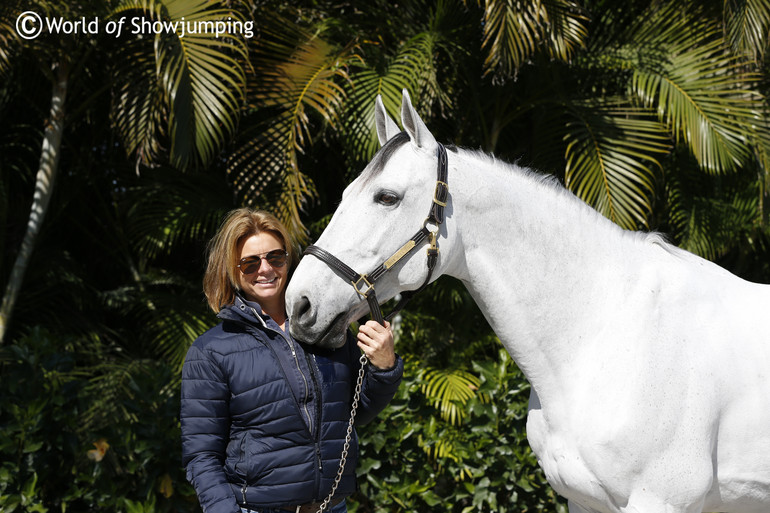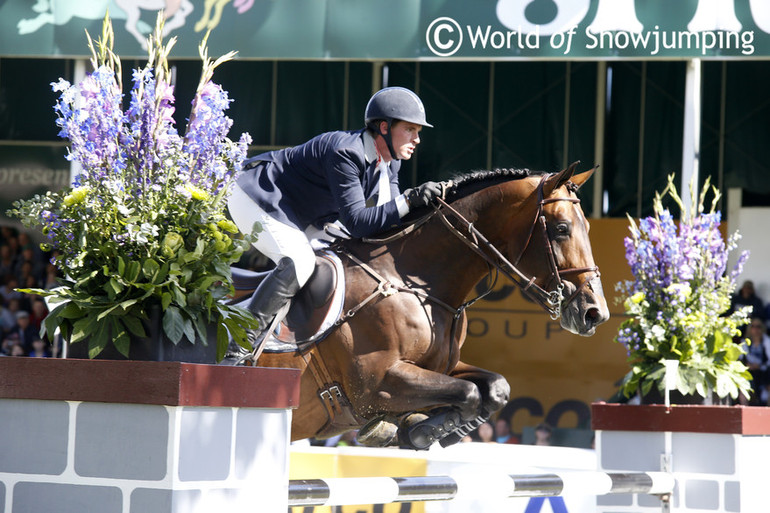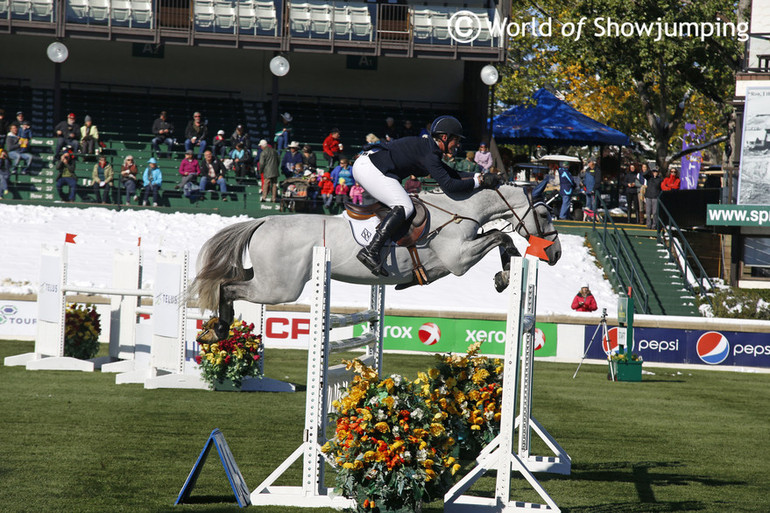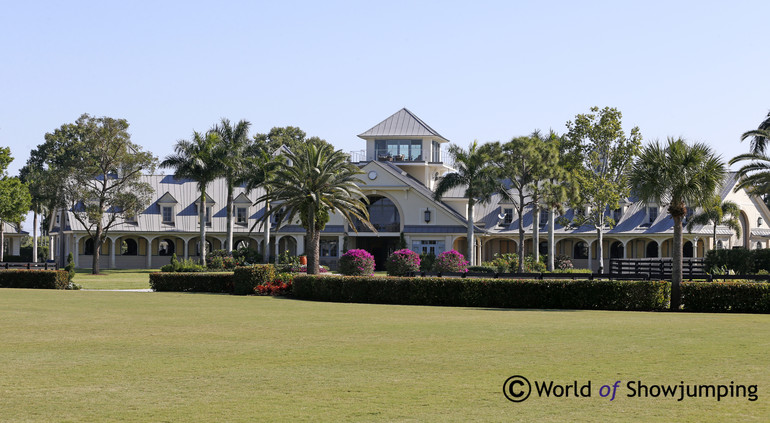Moni Sprenger has been working as a groom for more than 20 years and is a true veteran in the job. Despite so many years as a groom, there is no doubt about her passion for the horses and for the sport. For the last four years she has been working for Double H Farm and Quentin Judge, who made a big step up in the sport last year with horses like HH Copin van de Broy, HH Donnatella and HH Dark de la Heart. Double H Farm is based half a year in Wellington, Florida and half a year in Ridgefield, Connecticut.
"We come down here to Wellington at some point in November and then the horses get a bit time off during December. Then we start to compete at the Winter Equestrian Festival in January for twelve weeks. In April the horses have a bit of quiet time again as it is kind of intense here. And then we pack up and go north to our summer base," Moni explains of how a normal years look like.
Moni didn't start her grooming carrier in the US though, she worked almost 18 years for Urs Fäh in Switzerland. A job that kind of just happened. "I was in school and was obsessed with horses and wanted to be a rider. My friend's mum drove us around to riding schools and to the horses we could ride. She was amazing and I always had fantastic people taking care of me, to look after that I rode properly, took care of the horses properly and I was really lucky to have them," Moni says when looking back at how it all began. "I'm not from a horse family myself, so I always depended on someone else. Then we got the possibility to go and train for Urs and ended up being there more and more to help out and ride. It was a process and in the end I started to help out at the shows. I never learned this, it was more learning by doing or people showing me how to."
After taking the degree as an accoutant, which was her father's choice, Moni was free to do what she wanted and ended up as a rider at Urs. "I wasn't that talented, so it didn't go so well," Moni laughs. "At that time Urs’ show groom wanted to stay more at home so I gave it a go. I was always amazed that you could put everything in the truck, load the horses and off you go. To travel with the horses and live in the truck, I thought it was awesome and just loved it. I took my truck license which made it even better since I was totally independent. I could just take the horses and go. And so it continued. Urs was in the Olympic team, riding Nations Cups, World Cup finals and who doesn't want to do that? It was the time of my life,” Moni says with a big smile.
Then at one point Urs didn't really have the horses anymore and went to less and less shows which made Moni move along. When Kay Neatham left Bernardo Alves to start working for Marcus Ehning Moni started for Bernardo. "But I always had in mind to go to America. I just didn't have the connections and didn't know where to go or where to start. When I worked for Bernardo he was based at Pessoa’s yard in Belgium and at that time Rodrigo rode horses from Double H Farm. One day Rodrigo's groom Kate said that Double H was looking for someone. So I talked to Quentin, came here, loved it and stayed."
During the winter in Wellington they are based at one place and don't have to travel while it is quite a lot of traveling going on during the summer. "I've done this for over 20 years now with a lot of traveling and I got to the point where I would like to step back a little and stay home. I still have two horses that I groom myself, but I try to be more home and do more of the organization."
"I couldn't do it in Europe anymore - it is a one person show where you do everything. You drive the truck, you go to the shows, you are responsible for all the horses and you organize everything at home. Of course you most of the time have people helping you, but here it is much more organized and structured. You have your part that you are responsible for and you are not responsible for everything. I think I'm able to do a better job now as I don't have to be all over the place," Moni says about the different ways of working in the US and in Europe.
Normally the grooms have three - four horses to take care of and it is their responsibility that they look good, are groomed and to take them to the ring. "I still love doing this and I still love the horses, the shows and the job. But like I said: In Europe it is harder on you. I got a bit older and here it is easier. We still work and we are still busy, but it is easier on us."
We have to ask if Moni thinks it would be possible for someone that has been grooming in the US to start grooming in Europe. "I really don't think that would work. It is more likely you need to go the other way around. Even I couldn't go back now, although I have done it. I've done it all my life but it is no way I could go back. Don't get me wrong, back then I liked to have control of it all. To take the horses and go from show to show, it was like my own little business. I liked to get it all done. But now I'm slowing down and I don't mind being home more and take a step back. I got my green card last year and I bought a little house here in Wellington. It feels home and I love it. This is the place for me to be so I think I will get old here."
Questions and answers:
Is the level of the riders different in the US compared to Europe?
"Yes it is, big time. For me it is still in Europe where it all happens when it comes to showjumping. There are really good riders here and amazing horses, but when it comes to the quality of riding and the basic training Europe is better. You need to be a really good rider here to have a chance in Europe."
Has the sport changed during your years as a groom?
"A lot! It takes a lot to be among the top riders today, since it has become much tougher. But it is much more interesting to watch today with the technical courses - back in the days the fences were just big and wide. And before you had one big show a month and now you have several to choose from every week. It is crazy but it is good that the sport has moved along and gotten bigger. Now a days the sport has a bigger position with televisions and sponsors, which is cool."
How do you make the competition schedule for your horses during the Winter Equestrian Festival?
"We make a plan for each horse, because to compete twelve weeks is way too much. Maybe they show two weeks in a row and then they have two weeks off. Or if they had a big week they might be getting three weeks off. All the riders make their plan differently and it depends on their string of horses and how important the WEF is to the rider or the owner. But we try to make sure that our horses aren't competing too much."
Who is your favorite horse throughout the years?
"I couldn't tell. I have meet a lot of horses in this time and there are a few that you never will forget. They might not have been the best in the sport, but I connected with them in a special way. With some other horses you absolutely don’t connect and that's the way it is. So I can't say one horse, it is more of a handful of horses."












